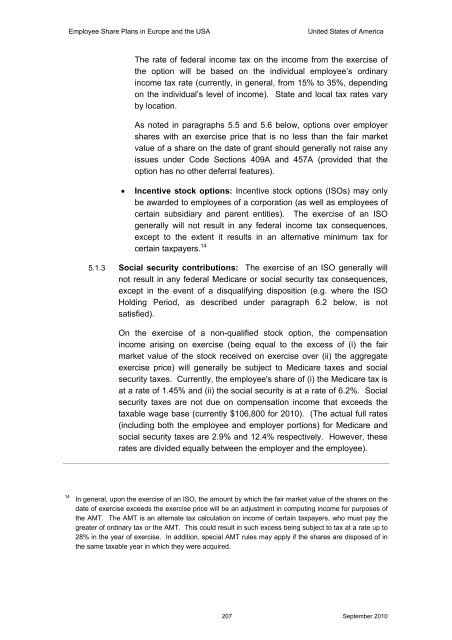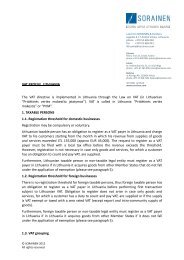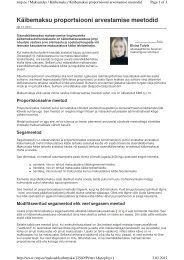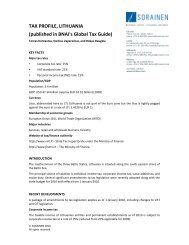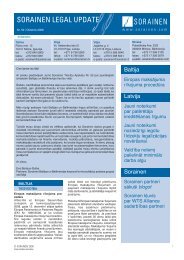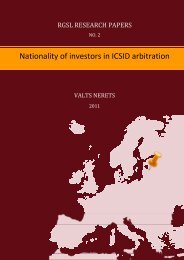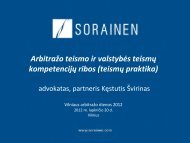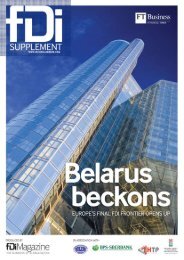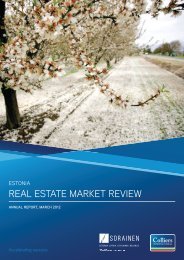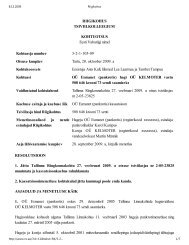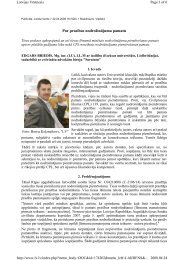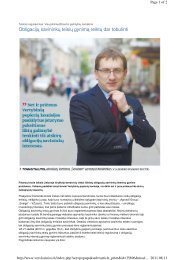Employee Share Plans in Europe and the USA - Sorainen
Employee Share Plans in Europe and the USA - Sorainen
Employee Share Plans in Europe and the USA - Sorainen
You also want an ePaper? Increase the reach of your titles
YUMPU automatically turns print PDFs into web optimized ePapers that Google loves.
<strong>Employee</strong> <strong>Share</strong> <strong>Plans</strong> <strong>in</strong> <strong>Europe</strong> <strong>and</strong> <strong>the</strong> <strong>USA</strong>United States of AmericaThe rate of federal <strong>in</strong>come tax on <strong>the</strong> <strong>in</strong>come from <strong>the</strong> exercise of<strong>the</strong> option will be based on <strong>the</strong> <strong>in</strong>dividual employee’s ord<strong>in</strong>ary<strong>in</strong>come tax rate (currently, <strong>in</strong> general, from 15% to 35%, depend<strong>in</strong>gon <strong>the</strong> <strong>in</strong>dividual’s level of <strong>in</strong>come). State <strong>and</strong> local tax rates varyby location.As noted <strong>in</strong> paragraphs 5.5 <strong>and</strong> 5.6 below, options over employershares with an exercise price that is no less than <strong>the</strong> fair marketvalue of a share on <strong>the</strong> date of grant should generally not raise anyissues under Code Sections 409A <strong>and</strong> 457A (provided that <strong>the</strong>option has no o<strong>the</strong>r deferral features).• Incentive stock options: Incentive stock options (ISOs) may onlybe awarded to employees of a corporation (as well as employees ofcerta<strong>in</strong> subsidiary <strong>and</strong> parent entities). The exercise of an ISOgenerally will not result <strong>in</strong> any federal <strong>in</strong>come tax consequences,except to <strong>the</strong> extent it results <strong>in</strong> an alternative m<strong>in</strong>imum tax forcerta<strong>in</strong> taxpayers. 145.1.3 Social security contributions: The exercise of an ISO generally willnot result <strong>in</strong> any federal Medicare or social security tax consequences,except <strong>in</strong> <strong>the</strong> event of a disqualify<strong>in</strong>g disposition (e.g. where <strong>the</strong> ISOHold<strong>in</strong>g Period, as described under paragraph 6.2 below, is notsatisfied).On <strong>the</strong> exercise of a non-qualified stock option, <strong>the</strong> compensation<strong>in</strong>come aris<strong>in</strong>g on exercise (be<strong>in</strong>g equal to <strong>the</strong> excess of (i) <strong>the</strong> fairmarket value of <strong>the</strong> stock received on exercise over (ii) <strong>the</strong> aggregateexercise price) will generally be subject to Medicare taxes <strong>and</strong> socialsecurity taxes. Currently, <strong>the</strong> employee's share of (i) <strong>the</strong> Medicare tax isat a rate of 1.45% <strong>and</strong> (ii) <strong>the</strong> social security is at a rate of 6.2%. Socialsecurity taxes are not due on compensation <strong>in</strong>come that exceeds <strong>the</strong>taxable wage base (currently $106,800 for 2010). (The actual full rates(<strong>in</strong>clud<strong>in</strong>g both <strong>the</strong> employee <strong>and</strong> employer portions) for Medicare <strong>and</strong>social security taxes are 2.9% <strong>and</strong> 12.4% respectively. However, <strong>the</strong>serates are divided equally between <strong>the</strong> employer <strong>and</strong> <strong>the</strong> employee).14In general, upon <strong>the</strong> exercise of an ISO, <strong>the</strong> amount by which <strong>the</strong> fair market value of <strong>the</strong> shares on <strong>the</strong>date of exercise exceeds <strong>the</strong> exercise price will be an adjustment <strong>in</strong> comput<strong>in</strong>g <strong>in</strong>come for purposes of<strong>the</strong> AMT. The AMT is an alternate tax calculation on <strong>in</strong>come of certa<strong>in</strong> taxpayers, who must pay <strong>the</strong>greater of ord<strong>in</strong>ary tax or <strong>the</strong> AMT. This could result <strong>in</strong> such excess be<strong>in</strong>g subject to tax at a rate up to28% <strong>in</strong> <strong>the</strong> year of exercise. In addition, special AMT rules may apply if <strong>the</strong> shares are disposed of <strong>in</strong><strong>the</strong> same taxable year <strong>in</strong> which <strong>the</strong>y were acquired.UK/1729295/03 207 September 2010


